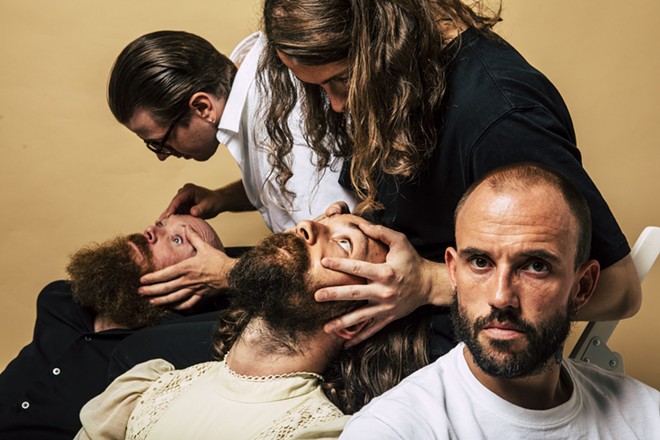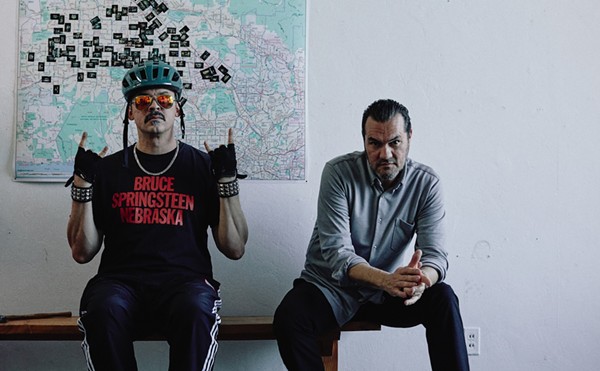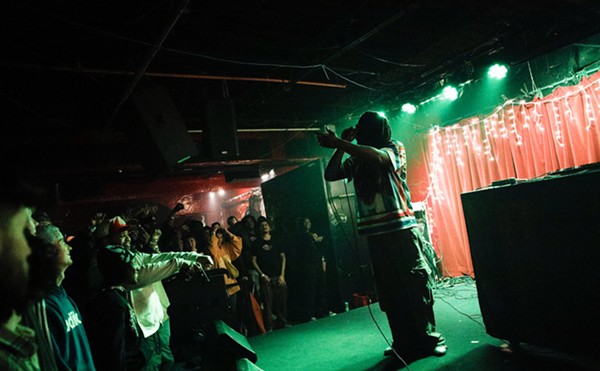In Advance of Upcoming Agora Show, IDLES Frontman Talks About the British Post-Punk Band's Musical Evolution
Group is touring in support of its latest album, 'Crawler'
By Jeff Niesel on Mon, Aug 29, 2022 at 12:34 pm
[
{
"name": "Ad - NativeInline - Injected",
"component": "38482495",
"insertPoint": "3",
"requiredCountToDisplay": "5"
},{
"name": "Real 1 Player (r2) - Inline",
"component": "38482494",
"insertPoint": "2/3",
"requiredCountToDisplay": "9"
}
]
When singer Joe Talbot started the post-punk band IDLES back in 2009, it was in response to what he perceived as a rather lackluster music scene in Bristol, England.
“We started the band with the premise that there were a lot of bands around who were driven by ego and not by the passion of live music,” he says in a recent Zoom call from Brussels with guitarist Mark Bowen by his side. IDLES performs on Friday, Sept. 9, at the Agora. “I wanted to start a band that exudes passion. I had good friends of mine — Bowen and [bassist] [Adam] Dev[onshire] — that I knew had the same energy that I had. I was a fan, and I wanted to feel that. I wanted to make something that represented what was missing in my world. I wanted to see it every night, and now I do. And now we do.”
As much as IDLES launched to “fill a gap,” as Talbot puts it, the group was not alone.
“A lot of our contemporaries were influences,” he says. “It wasn’t just bands from before. There were also Metz, Preoccupations, Protomartyr and Ice Age. There were so many great bands exploding at the same time. It felt like a wave of energy and people making something from a gap. It was a great time, and it is a great time. They’re all still creating amazing music. Before that, I wouldn’t say it was guitar music that led us to where we are. Before that, I was into hip-hop and techno and all sorts of other stuff. Post-punk was where we started. That wasn’t from a sense of history. That was from a sense of necessity. That was what we wanted to make together. That was what we knew we could make together well. It just felt right. It was appropriate that we made that music because that’s what we were all excited about at the time.”
Talbot and Bowen say they tried to be as “blunt as possible” on the band’s 2017 full-length debut, Brutalism, as well as the albums that immediately followed it.
“[By the time of Brutalism], we were really starting to find a groove,” says Bowen. “We got it, and the album came very quickly. It was representative of us at the time. We had become prolific in a short amount of time. Also, the press doesn’t really take EPs seriously. They might see it as an interesting document if a band is between albums. But people aren’t really concerned about precursors unless you’re hype as hell. For us, it was a natural growth. The LP is our niche now. It helps us explain ourselves. We have enough space and nuance, as we discovered on our last album, Crawler, to represent who we are as people and who we are as a band.”
A more introspective effort, Crawler finds Talbot exploring his personal battles with addiction. The album opens with the moody "MTT 420 RR," an ominous song that finds Talbot speaking more than singing in a Nick Cave-like baritone.
“To be honest, addiction and recovery and a yearning to be part of something bigger than yourself is something I’ve been working for 13 years,” says Talbot when asked about his approach to the songs on Crawler, adding that viewing art exhibitions inspire him more than books. “It’s my process. It’s the only thing I know how to write about. It comes out in different ways and different subjects. For me, it’s how I write a song and not what I write about that is a challenge and point of interest. All I can write about is what it’s in my head. I don’t force a subject, but I can change and explore and challenge myself in ways that it comes out. It’s more to do with poetry and prose and melody and rhythm and the structure and how I use words.”
A performance here at the Beachland Ballroom in 2019 provided the inspiration for the melancholy tune appropriately dubbed “The Beachland Ballroom.”
“It was a really good show,” says Talbot when asked about the gig. “It was a good crowd. [It was a] fun crowd. It was a killer lineup. [The Beachland] is one of my favorite venues in the world.”
With its mix of heavy rockers ("The Wheel") and industrial strength atmospheric numbers ("When the Lights Come On"), Crawler suggests just how much the band has evolved since its early days.
“With the first albums, my ego wanted me to be seen as this intellectual thing," says Talbot. "I knew that would ruin the songwriting. You become pretentious when you let your ego work toward something like that. It’s often shit and dishonest. I wanted to strip myself of that and strip myself of the poetics and intellectualism. Now, I’ve done that. We killed it in the hip-hop sense. We murdered it. We did it to death because we wanted to do that. Now, I can challenge myself with some poetry and whatever the fuck I feel like that day.”
“We started the band with the premise that there were a lot of bands around who were driven by ego and not by the passion of live music,” he says in a recent Zoom call from Brussels with guitarist Mark Bowen by his side. IDLES performs on Friday, Sept. 9, at the Agora. “I wanted to start a band that exudes passion. I had good friends of mine — Bowen and [bassist] [Adam] Dev[onshire] — that I knew had the same energy that I had. I was a fan, and I wanted to feel that. I wanted to make something that represented what was missing in my world. I wanted to see it every night, and now I do. And now we do.”
As much as IDLES launched to “fill a gap,” as Talbot puts it, the group was not alone.
“A lot of our contemporaries were influences,” he says. “It wasn’t just bands from before. There were also Metz, Preoccupations, Protomartyr and Ice Age. There were so many great bands exploding at the same time. It felt like a wave of energy and people making something from a gap. It was a great time, and it is a great time. They’re all still creating amazing music. Before that, I wouldn’t say it was guitar music that led us to where we are. Before that, I was into hip-hop and techno and all sorts of other stuff. Post-punk was where we started. That wasn’t from a sense of history. That was from a sense of necessity. That was what we wanted to make together. That was what we knew we could make together well. It just felt right. It was appropriate that we made that music because that’s what we were all excited about at the time.”
Talbot and Bowen say they tried to be as “blunt as possible” on the band’s 2017 full-length debut, Brutalism, as well as the albums that immediately followed it.
“[By the time of Brutalism], we were really starting to find a groove,” says Bowen. “We got it, and the album came very quickly. It was representative of us at the time. We had become prolific in a short amount of time. Also, the press doesn’t really take EPs seriously. They might see it as an interesting document if a band is between albums. But people aren’t really concerned about precursors unless you’re hype as hell. For us, it was a natural growth. The LP is our niche now. It helps us explain ourselves. We have enough space and nuance, as we discovered on our last album, Crawler, to represent who we are as people and who we are as a band.”
A more introspective effort, Crawler finds Talbot exploring his personal battles with addiction. The album opens with the moody "MTT 420 RR," an ominous song that finds Talbot speaking more than singing in a Nick Cave-like baritone.
“To be honest, addiction and recovery and a yearning to be part of something bigger than yourself is something I’ve been working for 13 years,” says Talbot when asked about his approach to the songs on Crawler, adding that viewing art exhibitions inspire him more than books. “It’s my process. It’s the only thing I know how to write about. It comes out in different ways and different subjects. For me, it’s how I write a song and not what I write about that is a challenge and point of interest. All I can write about is what it’s in my head. I don’t force a subject, but I can change and explore and challenge myself in ways that it comes out. It’s more to do with poetry and prose and melody and rhythm and the structure and how I use words.”
A performance here at the Beachland Ballroom in 2019 provided the inspiration for the melancholy tune appropriately dubbed “The Beachland Ballroom.”
“It was a really good show,” says Talbot when asked about the gig. “It was a good crowd. [It was a] fun crowd. It was a killer lineup. [The Beachland] is one of my favorite venues in the world.”
With its mix of heavy rockers ("The Wheel") and industrial strength atmospheric numbers ("When the Lights Come On"), Crawler suggests just how much the band has evolved since its early days.
“With the first albums, my ego wanted me to be seen as this intellectual thing," says Talbot. "I knew that would ruin the songwriting. You become pretentious when you let your ego work toward something like that. It’s often shit and dishonest. I wanted to strip myself of that and strip myself of the poetics and intellectualism. Now, I’ve done that. We killed it in the hip-hop sense. We murdered it. We did it to death because we wanted to do that. Now, I can challenge myself with some poetry and whatever the fuck I feel like that day.”
SCENE Supporters make it possible to tell the Cleveland stories you won’t find elsewhere.
Become a supporter today.
About The Author
Jeff Niesel
Jeff has been covering the Cleveland music scene for more than 20 years now. And on a regular basis, he tries to talk to whatever big acts are coming through town, too. If you're in a band that he needs to hear, email him at [email protected].
Scroll to read more Music News articles
Newsletters
Join Cleveland Scene Newsletters
Subscribe now to get the latest news delivered right to your inbox.













